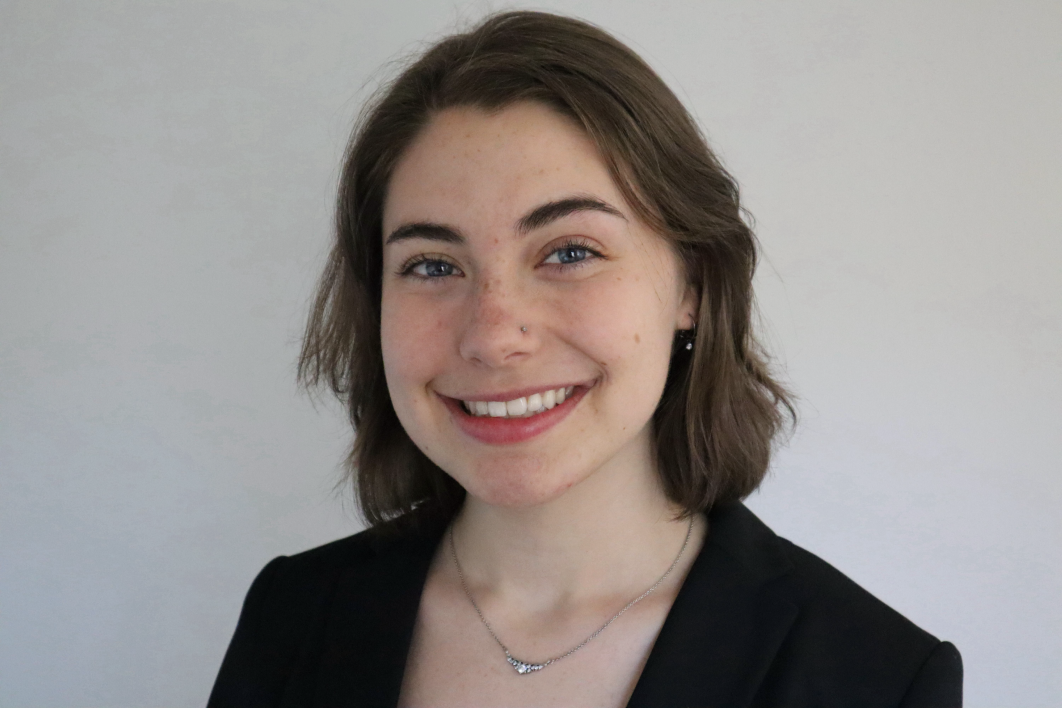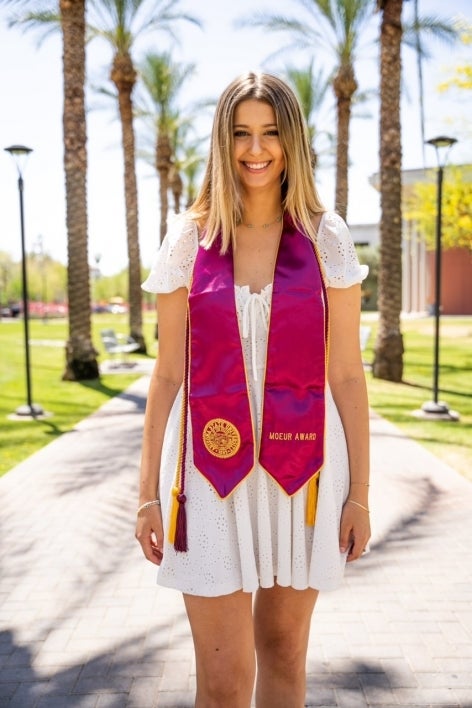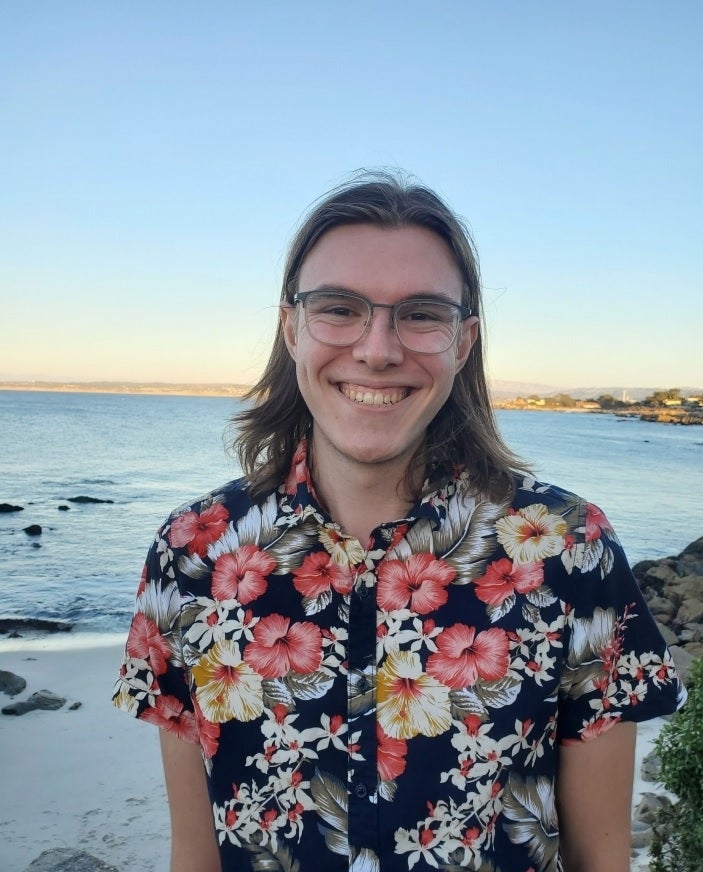ASU course exposes students to foreign policy, diplomacy

Participants in the 2023 Policy Design Studio and Internship Program in Washington, D.C., visited Mount Vernon, the historic home of President George Washington, 13 miles outside the nation's capital. Photo courtesy of the Policy Design Studio and Internship Program
Isabel Haas, an Arizona State University senior double-majoring in global studies and applied mathematics, has her sights set on a career in foreign service, and a course she calls an “embassy simulation” gave her a taste of what it would be like to work in a United States diplomatic post.
Haas, a student in Barrett, The Honors College at ASU, took the course, the Policy Design Studio (PDS) and Internship Program available through the Leadership, Diplomacy and National Security Lab, online last spring and participated in a simulated U.S. Embassy in Ankara, Turkey. The course was led by former U.S. ambassadors Edward O’Donnell and Roderick Moore.
“I would recommend this course to anyone even the tiniest bit interested in diplomacy or international affairs," Haas said. "The opportunity to work closely with and get feedback from former U.S. ambassadors who are invested in your education and want to see you succeed is huge, especially if you continue to stay in connection with them following the end of the class. Not to mention, you learn so much about diplomacy in action and a particular region."
Applications are now open for the program that will run Jan. 4 to April 28, 2024. The class will simulate the U.S. Embassy in Brazil in the spring 2024 semester.
In addition to the online course, the program offers a separate, in-person program in Washington, D.C., where participants live in the nation’s capital to study how foreign policy is made and intern up to four days a week at an organization of interest to them. Options include federal departments and agencies, law firms, lobbying and consulting firms, advocacy groups, media outlets, museums, think tanks and nonprofit organizations. On Fridays, students also participate in an in-person version of the embassy simulation course, also Brazil in spring 2024.
The deadline to apply for the in-person program is Oct. 29. For the virtual class, applications will be reviewed on a rolling basis until seats are filled. Find out more about the program and application requirements on the program website.
Isabel Haas
In the simulated embassy in Haas’ class, students were assigned embassy officer roles based on their interests, and the policy issues they researched and worked on were real.
Assignments included writing one-page memos and completing oral presentations on current events, issues and policy as if advising the actual ambassador of the embassy. They assembled as a country team during class and discussed real-time events; spoke with experts, including foreign service officers, ambassadors, scholars, activists and others; and worked on an integrated country strategy.
“I learned a lot about the inner workings of the State Department, how to write concisely and professionally, and became a self-proclaimed unofficial (Turkey) expert,” Haas said.
Haas said she also learned how the U.S. deals with international crises, noting that during the semester in the course, Turkey was hit by major earthquakes and was in the middle of a controversial presidential election season.
“The course allowed me to understand the complex dynamics between balancing U.S. interests abroad and the relationship with the country we were working in. This knowledge not only greatly improved my writing and public speaking abilities, but also has allowed me to engage in complex discussions on global politics resulting from the in-depth look the class provided,” she said.
Haas said she is very interested in working internationally in the future, whether with a nongovernmental organization or as a foreign service officer, and the course has given her the essential skills and information she needs to decide which path to pursue.
Rachel Hess
Rachel Hess, who graduated in last May with majors in political science and Spanish, interned in Washington, D.C. The highlights of her experience included meeting U.S. Secretary of State Antony Blinken, interviewing U.S. Ambassador to Turkey Jeff Flake, and interacting with Turkish university students, former and current ambassadors and embassy officials, and experts on Turkey and Turkish foreign policy.
"It was exciting to see real-time changes in foreign policy and examine how we, as a class, would handle American relations with (Turkey) and would adapt to global changes. As for my experience outside the class, I loved that I was able to get credit for my internship. I also enjoyed being in D.C. and exploring museums, networking, attending foreign policy events and living in a vibrant, international city," said Hess, whose career goals include working in diplomacy, international relations, human rights and humanitarian affairs.
Spencer Erjavic, who graduated ASU with bachelor’s degrees in political science and Russian in 2022, took the course as a way to gauge his interest in working for the U.S. government.
Erjavic, who was a student in Barrett Honors College, participated in simulations of embassy country teams — where each student had a specific portfolio of issues to discuss depending on real-world events — as well as conversations with experts on policy issues.
“The skills and knowledge I gained from the course have created a new, more nuanced and informed mindset when it comes to the world of policy and decision-making,” he said.
Spencer Erjavic
Erjavic said that while there is value in reading textbooks about different theories of international relations or structure and machinery of various international organizations, courses like the Policy Design Studio “thrust the real-world ... reins of foreign policy and international relations directly into the hands of the students, with the guidance of ambassadors Moore and O'Donnell, to truly understand what it is like to be a practitioner, not an academic talking about the practice."
He said students of all backgrounds should take the course, whether or not they are interested in pursuing a career in diplomacy or public policy.
“Even if they are not a political science major, they should apply if there are aspects of the PDS program that appeal to them. Just like in the real world, it is a good thing to have people with a diverse range of backgrounds and areas of expertise sitting around the table to plan a course of action. Engineering majors or business majors bring a different set of skills and mindsets to the conversation that add to, not detract from, the end result," he said.
“... Everything we learned, came prepared to discuss and attempted to address or solve could seamlessly be used in the real world in a diplomatic post abroad.”
Erjavic is putting what he learned as an undergraduate to practical use as a graduate student. He is halfway through a dual-degree program between the Middlebury Institute of International Studies and the Moscow State Institute of International Relations for a master’s degree in nonproliferation and terrorism studies, and a master’s degree in international relations, respectively.
“I am confident that I will be working on the issues that are near and dear to my heart, chiefly nuclear arms control, nonproliferation and disarmament, in a capacity that allows me to make a meaningful impact on these issues for the better,” he said.
More Law, journalism and politics
Can elections results be counted quickly yet reliably?
Election results that are released as quickly as the public demands but are reliable enough to earn wide acceptance may not…
Spring break trip to Hawaiʻi provides insight into Indigenous law
A group of Arizona State University law students spent a week in Hawaiʻi for spring break. And while they did take in some of the…

LA journalists and officials gather to connect and salute fire coverage
Recognition of Los Angeles-area media coverage of the region’s January wildfires was the primary message as hundreds gathered at…




